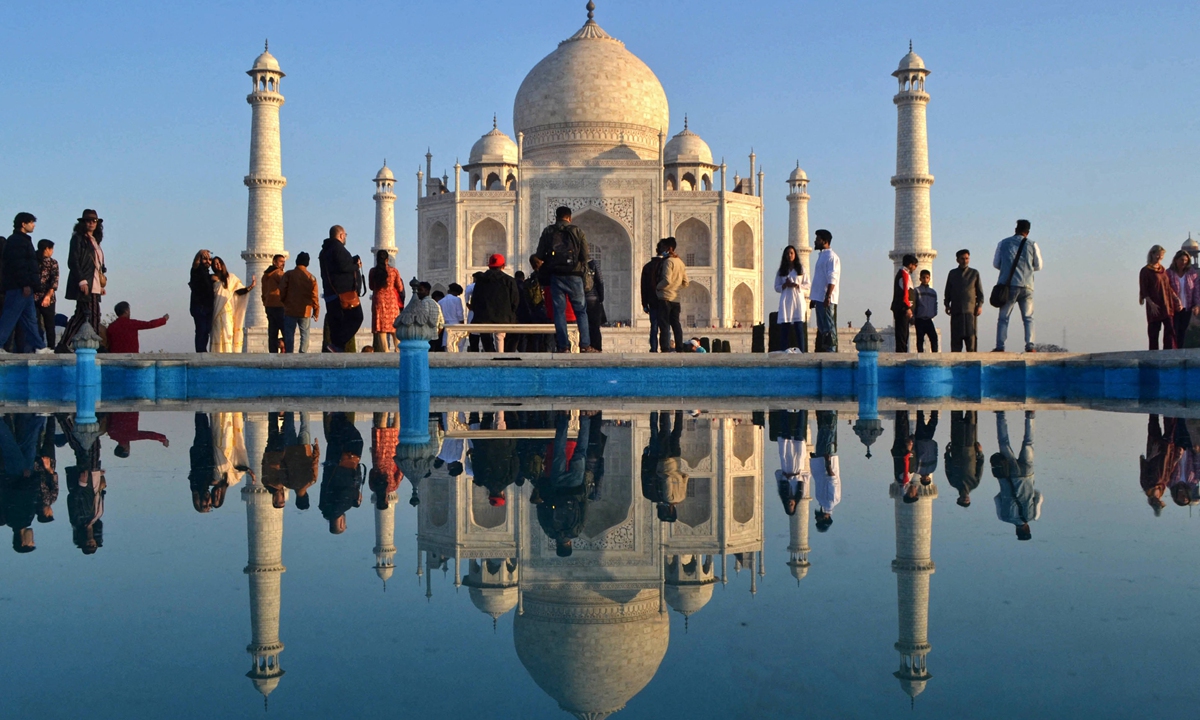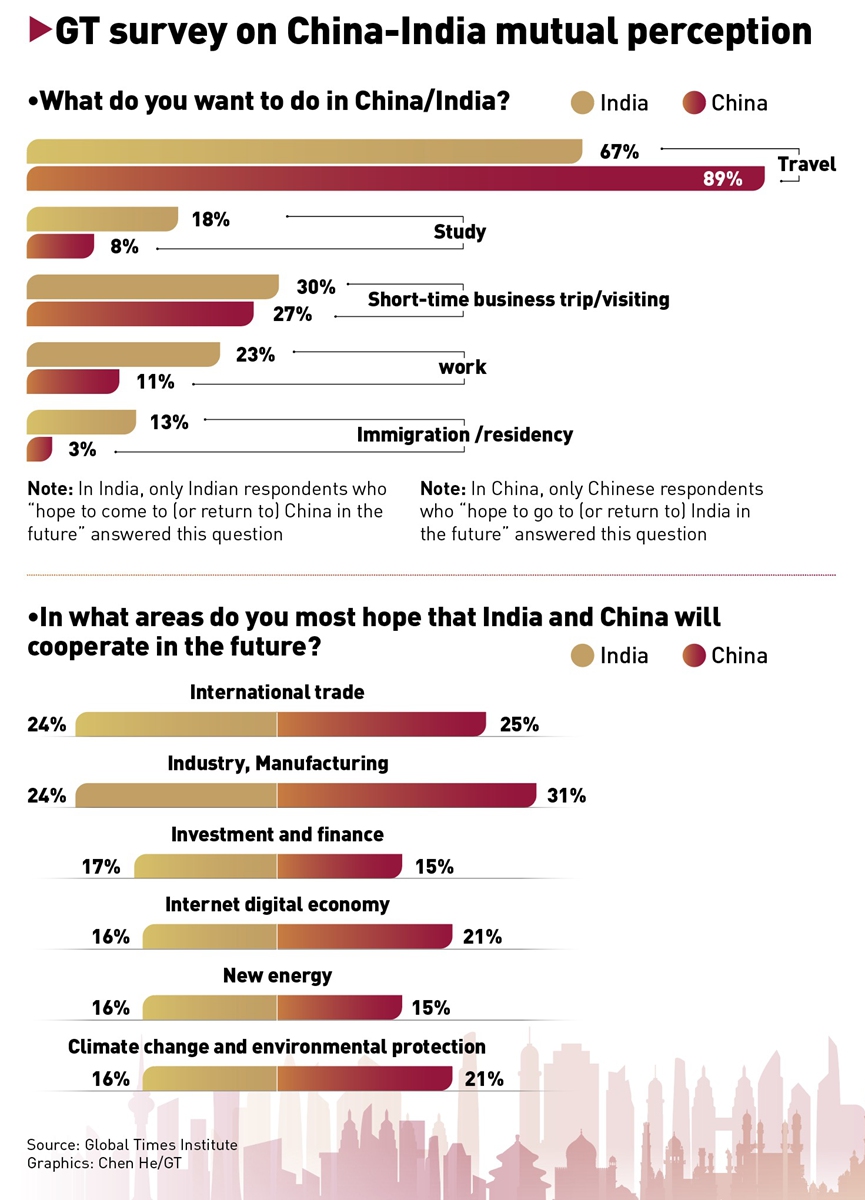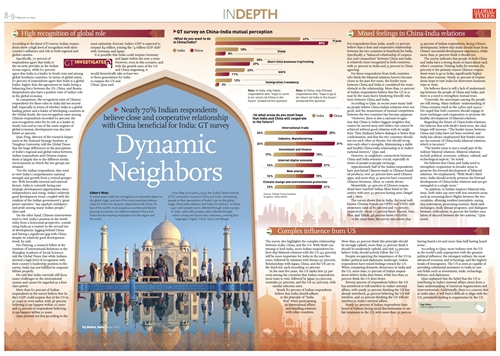IN-DEPTH / IN-DEPTH
Nearly 70% Indian respondents believe close and cooperative relationship with China beneficial for India: GT survey
Dynamic neighbors

Taj Mahal, India Photo: VCG
Editor's Note:In recent years, India has emerged as an important player on the global stage, and one of the most important relationships for India is its dynamic relationship with China. As two of the world's most populous countries and fastest-growing economies, the relations between China and India have far-reaching implications for the region and the world.
From May 23 to June 5, 2024, the Global Times Institute (GTI) conducted a survey in China and India, interviewing people on their perceptions of India's role on the global stage, China-India relations and India-US relations. In China, 1,440 valid samples were collected through online surveys. In India, 1466 valid samples were collected through online surveys and face-to-face interviews, covering four languages: English, Hindi, Tamil, and Bengal.
High recognition of global role
According to the latest GTI survey, Indian respondents show a high level of recognition with their country's influence and role in both regional and global contexts.
Specifically, 70 percent of respondents agree that India is the security provider in the Indian Ocean region, while 60 percent agree that India is a leader in South Asia and among global Southern countries. In terms of global status, 67 percent of respondents agree that India is a global leader, higher than the agreement on India being a balancing force between the US, China, and Russia. Respondents also have a positive view of India's role in the global economy.
In comparison, the recognition rates of Chinese respondents for these roles in India did not exceed half. Especially in terms of whether India is a global leading power and a leader of developing countries in the Global South, the non-recognition rates among Chinese respondents exceeded 60 percent; the non-recognition rates for its role as a leader in South Asia and as one of the main engines of global economic development was also just below 50 percent.
Qian Feng, director of the research department at the National Strategy Institute at Tsinghua University, told the Global Times that the huge differences in the perceptions of India's regional and global status between Indian respondents and Chinese respondents is largely due to the different media environments in which the two groups are situated.
"For the Indian respondents, they tend to view India's comprehensive national strength and growth from a vertical perspective. With favorable internal and external factors, India is currently facing rare strategic development opportunities since independence and rising. India's relatively good development trend, coupled with the catalysis of the Indian government's 'great power narrative,' has sparked confidence and pride among many Indian people," Qian said.
On the other hand, Chinese interviewees tend to view India's position in the world today from a horizontal perspective, considering India as a country in the second tier of development, lagging behind China and having a significant gap with China, despite its relatively good development trend, he said.
Hu Zhiyong, a research fellow at the Institute of International Relations at the Shanghai Academy of Social Sciences, told the Global Times that while Indians showed a high level of recognition with their country's leadership position in the survey, India has not fulfilled its responsibilities properly.
Hu said that India currently still faces many challenges in the international system and cannot be regarded as a first-class power.
More than 60 percent of Indian respondents in the survey believe that India's GDP could surpass that of the US in 30 years or even earlier, with 46 percent believing it can happen within 20 years and 25 percent of respondents believing it can happen within 10 years.
Qian pointed out that according to the most optimistic forecast, India's GDP is expected to surpass $4 trillion, joining the "4 trillion GDP club" with Germany and Japan.
It is possible that India could surpass Germany and Japan within the next 5 years. However, even in this scenario, and with the growth rates of the US and China stagnating, it would theoretically take at least two to three generations for India to surpass the US and China, Qian said.
More than 60 percent of Indian respondents in the survey believe that India's GDP could surpass that of the US in 30 years or even earlier, with 46 percent believing it can happen within 20 years and 25 percent of respondents believing it can happen within 10 years.
Qian pointed out that according to the most optimistic forecast, India's GDP is expected to surpass $4 trillion, joining the "4 trillion GDP club" with Germany and Japan.
It is possible that India could surpass Germany and Japan within the next 5 years. However, even in this scenario, and with the growth rates of the US and China stagnating, it would theoretically take at least two to three generations for India to surpass the US and China, Qian said.

Graphics: Global Times
Mixed feelings in China-India relationsFor respondents from India, nearly 70 percent believe that a close and cooperative relationship between the two countries is beneficial for India. Specifically, a "balanced relationship of cooperation and competition" between China and India is relatively more recognized in both countries, with 30 percent in India and 33 percent in China agreeing.
For those respondents from both countries who think the bilateral relations haven't become closer in the past five years, the border issue between China and India is considered the main obstacle to the relationship. More than 70 percent of Indian respondents believe that the US is or may be the main factor hindering friendly relations between China and India.
According to Qian, in recent years many Indian people believe China-Indian relations were not good, and the momentum of mutual competition between the two countries has become apparent.
"However, there is also a rational recognition that China is India's biggest neighbor that cannot be moved away and India's rise cannot be achieved without good relations with its neighbors. They [Indians] believe dialogue is better than confrontation, and that the two countries should not see each other as threats, but should recognize each other's strengths. Maintaining a stable and healthy China-India relationship is in India's national interest," Qian said.
However, as neighbors, connectivity between China and India remains crucial, especially in terms of people-to-people exchange.
Approximately half of the Indian respondents have purchased Chinese-made or Chinese-branded products; over 40 percent have used Chinese apps, and more than 30 percent have consumed Chinese literature, films, or variety shows.
Meanwhile, 90 percent of Chinese respondents have watched Indian films listed in the survey, with over 40 percent having seen Dangal and 3 Idiots.
The survey shows that in India, the most well-known Chinese brands are OPPO and VIVO, with awareness rates of 80 percent and 79 percent, respectively. About 70 percent know Xiaomi, OnePlus, and Tiktok; 48 percent know SHAREit.
At the same time, the survey also shows that 53 percent of Indian respondents, facing China's development, believe that India should learn from China's successful development experience, while more than 30 percent think it should not.
The survey indicates that people in both China and India have a strong desire to learn about each other's countries. Visiting India for tourism (89 percent) is the primary reason Chinese respondents want to go to India, significantly higher than other reasons. Nearly 30 percent of respondents hope to visit India for short-term business trips or visits.
Hu believes there is still a lack of understanding between the people of China and India, and there is a need to strengthen mutual trust.
"Currently, the stereotypes among the people are still strong. Many Indians' understanding of China remains stuck in the 1980s and 1990s." Hu urged that both countries should engage in more exchanges and cooperation to promote the healthy development of bilateral relations.
Regarding the future of China-India relations, Hu believes that with Modi's third term, the challenges will increase. "The border issues between China and India have not been resolved, and India has always emphasized that border issues are the entirety of China-India bilateral relations, which is incorrect."
"The border issue is just a small part of the military bilateral relations. Bilateral relations include political, economic, military, cultural, and technological aspects," he noted.
Hu believes that China and India need to strengthen cooperation in broader areas to promote the forward development of bilateral relations. He emphasized, "With Modi's third term, India should actively promote the forward development of China-India relations and not get entangled in a single issue."
"In addition, to further improve bilateral relations, both sides can start with less sensitive areas, such as resuming direct flights between the two countries, allowing resident journalists, easing visa restrictions, promoting tourism, think tank exchanges, study abroad programs, and dialogues between civilizations, to prevent the further escalation of discord between the two nations," Qian noted.
Complex influence from US
The survey also highlights the complex relationship between India, China, and the US. With Modi continuing to lead India, more Indian respondents believe that bilateral relations with the US (42 percent) will be more important for India in the next five years, followed by relations with Russia (37 percent). Relationships with Japan, China, and the UK are in the third tier, each exceeding 20 percent.
In the next five years, the US ranks first (31 percent) among the countries that Indian respondents most want to visit, followed by Japan (23 percent), Australia (21 percent), and the UK (21 percent), with similar selection rates.
Nearly 80 percent of Indian respondents believe that India should adhere to the principle of "India first" when participating in international affairs and handling relations with other countries. More than 40 percent think this principle should be strongly upheld, more than 30 percent think it should be moderately upheld, and only 14 percent believe India should actively follow the US.
Despite recognizing the importance of the US in India's political and diplomatic landscape, Indian respondents have mixed feelings toward the US. When comparing domestic democracy in India and the US, more than 70 percent of Indian respondents believe India does better, while less than 30 percent think the US does better.
Seventy percent of respondents believe the US has interfered or will interfere in India's internal affairs, with nearly 30 percent thinking the US has already interfered, 41 percent believing the US will interfere, and 20 percent thinking the US will not interfere in India's internal affairs.
Nearly 90 percent of Indian respondents have heard of Indians facing racial discrimination or unfair treatment in the US, with more than 30 percent having heard a lot and more than half having heard some.
According to Qian, most Indians view the US as the world's only superpower with the greatest political influence, the strongest military, the most advanced economy and technology, and the highest intake of immigrants. The US is seen as capable of providing substantial assistance to India in various fields such as investment, trade, technology, defense, and diplomacy.
Qian explained that the belief that the US is interfering in India's internal affairs stems from a basic understanding of American hegemonism and interventionism. Additionally, there is a concern that as India rises, it will find it difficult to align with the US, potentially leading to suppression by the US.

Global Times
